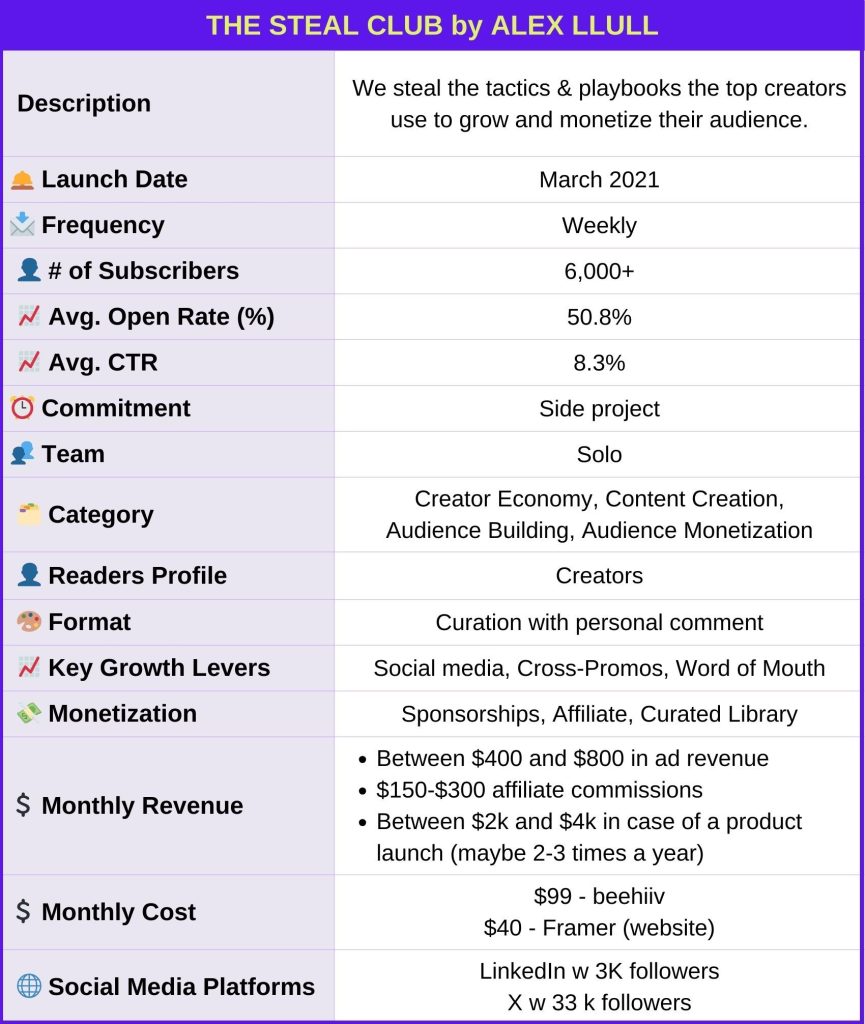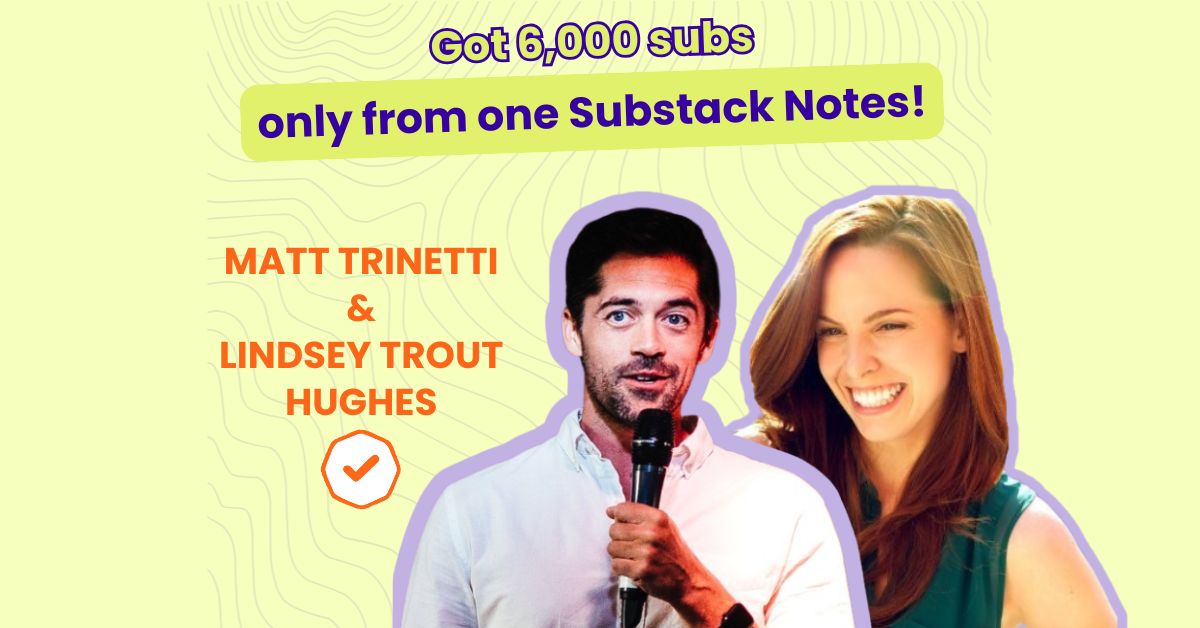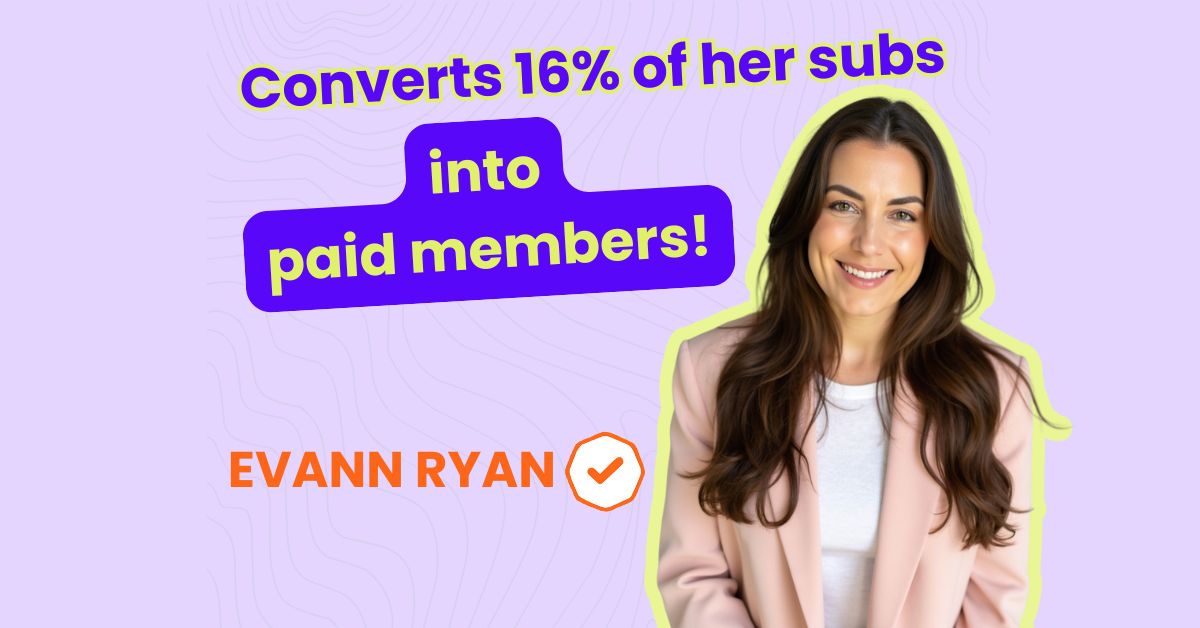Interview Date: June 09, 2024
Table of Content
CREATOR INTERVIEW

Alex Llull shows us how to steal growth & monetization tactics from top creators like a pro in The Steal Club. Today, it’s our turn to steal from him!
It all started when he realized that competition was not something to get frustrated with but actually, a true source of inspiration to improve his work.
Since then, his newsletter, which now reaches over 6,000 subscribers, has helped him build a solid audience, land his current job at Taplio and form valuable relationships in the industry. Beyond all that, he’s having fun doing it.
In our discussion today, we talked about:
- How his perception of consistency evolved over time and why he failed with a daily publishing schedule
- His growth strategies, including his 2 favorites for growing on social media
- How his podcast and newsletter complement each other
- The most critical information to share in sponsor decks
- 4 pieces of golden advice to aspiring creators
Let’s dive in!
NEWSLETTER IDENTITY CARD

TOOL STACK
- ESP → Beehiiv*
- Writing → Beehiiv* & Notion
- Task Management → Notion
- Curation & Note taking → Notion
- Design of visuals → Canva
- Website → Framer
- Digital products → Hosted in Framer + FramerAuth
- Social Media Tools → Taplio, Tweet Hunter
- Sponsorship → Passionfroot
- Podcast (recording, editing, transcript etc) → Mumbler.io, Otter.ai & Streamyard
- Payments → Lemon Squeezy
MEET THE CREATOR
Welcome Alex. Let’s start with getting to know you.
Hey! My name is Alex, and I’m from Mallorca, an island on the west coast of Spain, but I currently live in Madrid.
My background is in advertising. I have five years of experience working in different ad agencies on all kinds of projects (from beer brands to gaming brands). From there, during the 2020 pandemic, the agency office where I worked closed, so I started freelancing until very recently when I joined Taplio to lead the growth there.
On the side, I’m also running The Steal Club.
START
How and why did you start The Steal Club in the first place?
The Steal Club’s first version was born in 2020, after leaving the agency and figuring out what’s next.
During that time, I thought building my personal brand would be a great idea to get freelance clients, so I turned to Twitter. However, despite my initial efforts, I struggled A LOT.
My content wasn’t getting any engagement, traction, or followers. The frustration increased as I saw others who started simultaneously grow an audience faster than me.
And that’s when it clicked.
My problem before was that I saw these people as competition. But they were not.
They were an inspiration. They cracked the code, and I hadn’t.
So I could actually go see what they were doing and “steal” it.As a result, things finally started falling into place, and my personal brand grew way faster.
I figured that if this “stealing” thing worked for me, why not for others?
I started compiling the tactics and playbooks these people were using and sharing them in a weekly email. That’s how The Steal Club was born.
CONSISTENCY
You started The Steal Club as a daily newsletter, but it failed for you because it was too stressful. Based on your experience, what are the most critical questions creators should ask themselves when deciding their publishing frequency?
We need to backtrack here. Before publishing frequency, the most important thing is the topic. Choose a trending topic you are not passionate about and you’ll burn out quickly. Choose a topic that you are obsessed with, and you can write about it daily.
That said, weekly publishing is a great frequency to get started, but everyone should evaluate how much time they can dedicate to it.
You’ve been publishing content almost daily on X for three years. Recently, you gave a one-week break since you didn’t feel fresh. You also shared this in your newsletter, saying, “In the past, a break like this would have scared me. Now, I see it as an opportunity to come back even stronger.”.
How is your approach to the concept of “being consistent” changed over time as a creator?
Consistency is essential when starting, not so much because of the audience growth side of it but because it’s great to find your own voice. The more posts you publish, the more content formats you play with, the easier it will be for you to find it.
Once that happens, pulling the plug and shifting the focus from quantity to quality is easier. With so much noise out there these days about AI and all that, I think that the creators who focus on quality will win.
GROWTH
Speaking of social media, let’s talk about how you used it to grow your newsletter. What is your strategy to turn followers into newsletter subscribers?
A few years ago, it was as easy as putting a plug under your most popular tweets, and that’s it. That doesn’t work as well anymore. What I see working right now are two things:
- Automated giveaways type of posts where you give something of value (usually a lead magnet) out in exchange for a like or RT or comment on that post
- Teaser posts, teasing the upcoming day’s newsletter topic. Great example.
Which growth strategies did you utilize to reach over 6,000 subscribers?
It has been the same ever since I started, in all stages of growth:
- Form relationships with other creators so you can cross-promote with them.
- Share free quality content online and prompt the people for the newsletter if they “want more of the same.”
- Casually mention the newsletter whenever it makes sense on social media.
And that’s about it! I don’t have lead magnets (although that is changing very soon), and I haven’t invested in paid growth either (yet).
You’re also running a podcast alongside your newsletter. What prompted you to start a podcast in addition to your newsletter? How do these two mediums complement each other?
If I’m honest, it was born as an excuse for me to get in conversations with other creators. Instead of a “can I pick your brain” type of invitation, I invite them to my podcast.
The podcast and the newsletter complement each other because both are branded under the “Steal” umbrella. Since the conversations tend to be very tactical, some of the nuggets they drop are also shared in the newsletter. Then, if someone wants to dig deeper into that creator, they can listen to the pod episode.
MONETIZATION
Given your expertise in brand partnerships, I’d like to talk about your monetization strategy.
When did you decide it was the right time to monetize your newsletter? How has your ad pricing strategy evolved over time?
Early on, I decided to monetize the newsletter. I knew ads would be the easiest way to do that, so I called my subscribers to look for sponsors.
Luckily, a few people replied and that’s how we got the first sponsors. We charged less than $40 per ad.
With time, I kept raising the prices, and the ads kept getting sold, which I took as a sign that it was still too cheap. We reached the current price ($229) a few months back, and things stabilized, so it seems we have hit our sweet spot for the current growth level.
What key information do you always share with sponsors both before and after launching an ad in your newsletter?
You can take a look here, but the basics are:
- Newsletter core metrics
- Price
- Past examples of successful ads
- Sponsor testimonials if you have them
- Potential ROI for them (how many clicks can they expect? etc.)
You must consider what you would like to get if you were the sponsor: the more clarity, the better. There’s no point in hiding metrics.
You recently launched a curated library of growth tactics you’ve shared. How has it been going so far? Could you also walk us through your launch strategy?
What we launched right now is v2 of our curated library of growth tactics. V1 launched late last year, and it went well. After being set to a small subset of our audience, it made around $3,000.
This v2 is more complete, with more tactics (+100) and better infrastructure (the version before was built on Notion; this one is built on the actual Steal Club version).
We haven’t done a proper relaunch yet, but we will do it soon, although the product is already available.
IMPACT & LEARNINGS
How did building The Steal Club contribute to your life professionally and personally?
The Steal Club has opened many doors professionally. It helped me land my current role as the company’s founder was a subscriber. It also led to a couple of freelance opportunities.
Personally, I just have fun doing it! It’s something I look forward to every week!
If you had a chance to start over, what would you do differently while building The Steal Club?
I would start surveying my audience early on. Whenever a new member joins, we conduct a short survey to understand where they are coming from, their struggles, and what they expect… This information is handy for us when creating content and building different digital products.
If I had done this earlier, I would have had more insights into my current audience.
What would it be if you had the right to give one piece of advice to aspiring newsletter creators?
- Don’t follow the trends. Don’t start an AI newsletter because everyone else is starting one. Pick a topic you actually care about. If you do, chances are others too.
- You are better off with 500 high-quality, targeted subscribers than 10,000 random people who don’t even remember why they signed up.
- Try to give the format a different spin. Morning Brew is successful because it came first. The 100s of later copies won’t have the same level of success.
- Make a decision about what type of newsletter you are building early on: is it a personal newsletter? Or a brand newsletter? They look similar, but how they grow and monetize is very different.
Where to find Alex Llull
*indicates affiliate links


